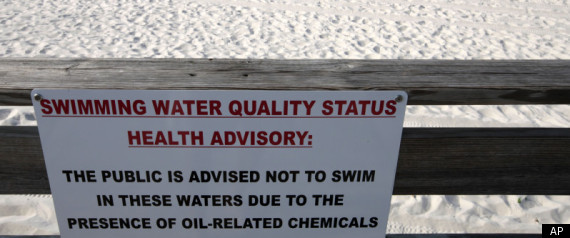
As the one-year anniversary of the BP oil spill approaches, some scientists have deemed the health of the Gulf of Mexico as "nearly back to normal," though countless workers involved in cleaning up the aftermath of the disaster are reporting mysterious and unexplained illnesses.
The Associated Press reports that scientists have graded the Gulf's ecosystem health now as just a few points below where it was before the spill. Granted, the scientists go on to voice concern for the mysterious deaths of hundreds of young dolphinsand turtles, dead patches of sea floor, and stained crabs.
Jane Lubchenco, the head of the National Oceanic and Atmospheric Administration said, the Gulf is "much better than people feared, but the jury is out about what the end result will be."
What exactly are people defining as “the Gulf” when they say it is better than expected? It seems the workers who helped to clean the Gulf during the oil spill and local residents are not counted in this “better than people feared” assessment.
Jamie Simon’s health is certainly not back to normal. According to the AFP, Simon worked on a barge for six months after the oil spill, cooking for the cleanup workers. When dispersants were sprayed, she tells the news organization, "I was exposed to those chemicals, which I questioned, and they told me it was just as safe as Dawn dishwashing liquid and there was nothing for me to worry about." Now, the 32-year-old suffers from dizziness, vomiting, ear infections, swollen throat, poor sight in one eye and memory loss.
The health effects of oil spill dispersants are a hotly contested issue, and many doctors maintain that exposure to the spill and dispersants cannot be directly linked to adverse health effects being reported. According to the Centers For Disease Control and Prevention, long-term exposure todispersants can cause central nervous system problems or damage to blood, kidneys and livers.
A TIME article released after the oil spill explained that "oil isn't just oil — it also contains volatile organic compounds like the carcinogen benzene." It cited doctors who said there is evidence that "short-term lung, kidney and liver functions could be affected" by exposure to volatile organic compounds from oil spills.
Beyond Jamie Simon, 415 other people in the state of Louisiana are also not “back to normal.” According to the AFP, the state has reported 415 cases of oil spill-related health problems. Symptoms include sore throats, irritated eyes, respiratory tract infections, headaches and nausea.
The Natural Resource Defense Council’s Rocky Kistner recently wrote for The Huffington Post about Andre Gaines, 27, a single father of two sons, who recently spoke at the Power Shift 2011 conference about his work on the oil spill cleanup:
During the hot summer cleanup last summer, Andre says planes would fly overhead spraying chemical dispersants that would drift over the workers, burning people’s skin and making it hard to breathe. Andre says he watched workers collapse from exposure to toxic fumes of the oil. Soon, Andre says he succumbed himself and spent days in the hospital with “tubes and IV coming out of everyplace in my body.”
Later, Andre says BP promised him $21,000 to pay his medical claims, but when he followed up, the phone had been disconnected.
Mike Robichaux is a local doctor who has seen up to 60 patients in recent weeks with a mysterious sickness that some attribute to BP’s oil spill. Dr. Robichaux has been making house calls because many of the “stoic” workers don’t want others to know that they are sick. Yet, Dr. Robichaux tells the AFP, “Ninety percent of them are getting worse... Nobody has a clue as to what it is."
Reuters reports that the U.S. National Institutes of Health has launched a ten-year study on the health of 55,000 oil spill clean-up workers and volunteers. Perhaps it will take ten years to get an answer for Dr. Robichaux.
Not everyone blames the oil spill for the health problems plaguing Gulf cleanup workers. Namely, BPdoes not blame the BP oil spill for the health problems plaguing Gulf cleanup workers. In a BP comment to the AFP, the company wrote, “Illness and injury reports were tracked and documented during the response, and the medical data indicate they did not differ appreciably from what would be expected among a workforce of this size under normal circumstances.”
As for compensating sick workers, this would fall under state law and “must be supported by acceptable medical evidence.” Are the 415 Louisianans suffering from respiratory tract infections, nausea, and headaches evidence enough?
It will take more than a one-year anniversary for the health of many oil spill cleanup workers to go “back to normal,” and for solid scientific evidence to determine whether the mysterious illnesses that plague them are truly the result of the oil spill, as they believe them to be.
No comments:
Post a Comment